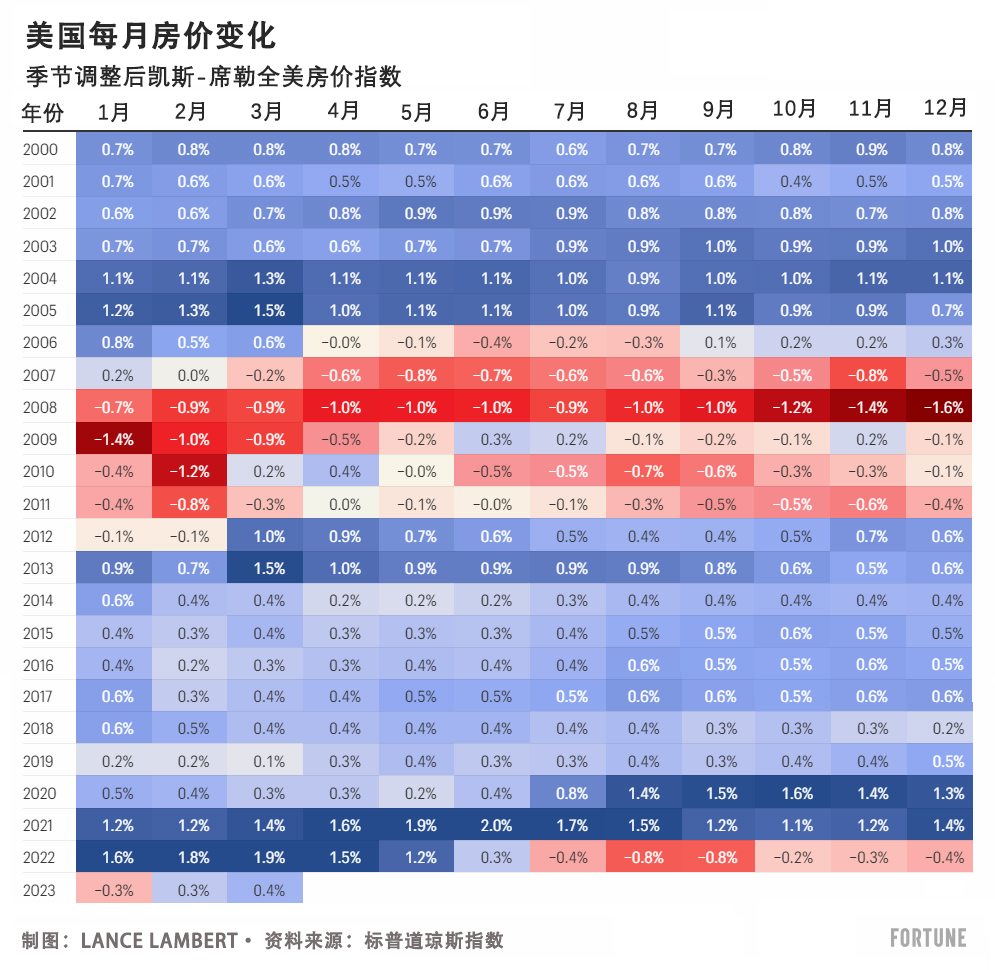
毋庸置疑,商業地產市場不容樂觀,尤其是辦公樓領域。
最近紐約大學(New York University)和哥倫比亞大學(Columbia University)的研究人員本月早些時候發布的修改預測認為,僅紐約市辦公樓的價格到2029年就會暴跌高達44%。這遠高于研究人員一年前發布的預測。當時他們預測到2029年,紐約市辦公樓的價格將暴跌28%。
持續的遠程辦公和加息,以及許多商業地產貸款到期,成為人們不看好商業地產的根本原因。然而,至少特斯拉(Tesla)CEO埃隆·馬斯克認為,房價下跌潮將很快蔓延到商業地產以外的市場。
上周一,馬斯克發推文暗示,住宅房地產即將下跌。他表示:“美國商業地產價格正在快速暴跌。接下來就是住宅價格。”
馬斯克并未解釋他認為美國房價會有多大降幅,以及他認為房價下跌的原因。也有人反駁了他的觀點。
上周二,Redfin CEO格倫·凱爾曼發推文反駁馬斯克稱:“商業地產需求下降卻能促進住宅地產的需求。居家辦公者需要家中有更多空間。銷量下降的原因是住宅存量在下降。現在, 房價已經連續兩個月上漲。”
去年,舊金山聯邦儲備銀行(Federal Reserve Bank of San Francisco)的研究人員發布的一項研究,為疫情期間遠程辦公刺激房價這種觀點提供了佐證。舊金山聯儲的論文稱,到2021年11月疫情期間的房地產市場繁榮,超過50%可以歸因于疫情導致的遠程辦公趨勢所帶來的對“空間”的需求增長。
舊金山聯儲的研究人員寫道:“我們的研究結果顯示,疫情期間的房價上漲體現的是基本面的變化,而不是投機泡沫。這意味著遠程辦公的發展,可能是未來住房成本和通脹的重要決定因素。”

那么,凱爾曼和馬斯克,誰的預測會是準確的?房地產行業內部存在巨大分歧。
雖然季節調整后Case-Shiller全美房價指數顯示,全美房價小幅下跌,較2022年6月下跌了2.2%,但房地產市場并未全面崩盤。舊金山(較2022年最高點下跌12.9%)、鳳凰城(下跌8.4%)和拉斯維加斯(下跌9.0%)等市場房價大幅下跌。然而,在中西部的芝加哥等許多城市以及邁阿密等東海岸城市,房價依舊接近史上最高水平。
Zillow和CoreLogic等公司的經濟學家們認為,全美房價已經觸底,但穆迪分析(Moody's Analytics)和房利美(Fannie Mae)等公司卻認為,全美房價將很快上漲進入調整期。據Case-Shiller指數顯示,2月和3月的全美房價環比上漲。(財富中文網)
翻譯:劉進龍
審校:汪皓
毋庸置疑,商業地產市場不容樂觀,尤其是辦公樓領域。
最近紐約大學(New York University)和哥倫比亞大學(Columbia University)的研究人員本月早些時候發布的修改預測認為,僅紐約市辦公樓的價格到2029年就會暴跌高達44%。這遠高于研究人員一年前發布的預測。當時他們預測到2029年,紐約市辦公樓的價格將暴跌28%。
持續的遠程辦公和加息,以及許多商業地產貸款到期,成為人們不看好商業地產的根本原因。然而,至少特斯拉(Tesla)CEO埃隆·馬斯克認為,房價下跌潮將很快蔓延到商業地產以外的市場。
上周一,馬斯克發推文暗示,住宅房地產即將下跌。他表示:“美國商業地產價格正在快速暴跌。接下來就是住宅價格。”
馬斯克并未解釋他認為美國房價會有多大降幅,以及他認為房價下跌的原因。也有人反駁了他的觀點。
上周二,Redfin CEO格倫·凱爾曼發推文反駁馬斯克稱:“商業地產需求下降卻能促進住宅地產的需求。居家辦公者需要家中有更多空間。銷量下降的原因是住宅存量在下降。現在, 房價已經連續兩個月上漲。”
去年,舊金山聯邦儲備銀行(Federal Reserve Bank of San Francisco)的研究人員發布的一項研究,為疫情期間遠程辦公刺激房價這種觀點提供了佐證。舊金山聯儲的論文稱,到2021年11月疫情期間的房地產市場繁榮,超過50%可以歸因于疫情導致的遠程辦公趨勢所帶來的對“空間”的需求增長。
舊金山聯儲的研究人員寫道:“我們的研究結果顯示,疫情期間的房價上漲體現的是基本面的變化,而不是投機泡沫。這意味著遠程辦公的發展,可能是未來住房成本和通脹的重要決定因素。”
那么,凱爾曼和馬斯克,誰的預測會是準確的?房地產行業內部存在巨大分歧。
雖然季節調整后Case-Shiller全美房價指數顯示,全美房價小幅下跌,較2022年6月下跌了2.2%,但房地產市場并未全面崩盤。舊金山(較2022年最高點下跌12.9%)、鳳凰城(下跌8.4%)和拉斯維加斯(下跌9.0%)等市場房價大幅下跌。然而,在中西部的芝加哥等許多城市以及邁阿密等東海岸城市,房價依舊接近史上最高水平。
Zillow和CoreLogic等公司的經濟學家們認為,全美房價已經觸底,但穆迪分析(Moody's Analytics)和房利美(Fannie Mae)等公司卻認為,全美房價將很快上漲進入調整期。據Case-Shiller指數顯示,2月和3月的全美房價環比上漲。(財富中文網)
翻譯:劉進龍
審校:汪皓
There’s no doubt about it: Things aren’t looking so great for commercial real estate, especially for office space.
Look no further than a revised forecast issued earlier this month by a group of researchers from New York University and Columbia University, which predicts that office values in New York City alone will plummet a staggering 44% by 2029. That’s much steeper than the group’s prior prediction—issued a year ago—for NYC office values to fall 28% by 2029.
The stickiness of remote work, coupled with interest rates spiking just as many commercial real estate loans come due, is the underlying source of the commercial real estate bearishness. However, at least in the eyes of Tesla CEO Elon Musk, property declines will soon spread beyond commercial real estate.
On Monday, Musk insinuated that pain awaits the residential housing market when he tweeted that “Commercial real estate is melting down fast. Home values next.”
Musk didn’t say how much he thinks U.S. home prices will fall—nor did he explain why. He also got some pushback.
On Tuesday, Redfin CEO Glenn Kelman shot back at Musk, tweeting, “But the loss in demand for commercial real estate is what’s driving demand for residential real estate. People who work from home need more space at home. Sales volume is down because inventory is down. Today, home prices increased for a second straight month.”
The idea that remote work has boosted home prices during the pandemic is supported by research published last year by researchers at the Federal Reserve Bank of San Francisco. The San Francisco Fed paper argues that upwards of 50% of Pandemic Housing Boom gains through November 2021 can be attributed to an elevated demand for “space” created by the pandemic’s remote work shift.
“Our results suggest that rising house prices over the pandemic reflected a change in fundamentals rather than a speculative bubble. This implies that the evolution of remote work may be an important determinant of future housing costs and inflation,” wrote the team of San Francisco Fed researchers.
So who is right, Kelman or Musk? The industry is fairly divided.
While national home prices have fallen a bit—down 2.2% from June 2022 according to the seasonally adjusted Case-Shiller National Home Price Index—they aren't crashing broadly. Some markets like San Francisco (down 12.9% from its 2022 peak), Phoenix (down 8.4%), and Las Vegas (down 9.0%) have fallen sharply. However, many places in the Midwest, like Chicago, and along the East Coast, like Miami, are still near all-time highs.
Economists at firms like Zillow and CoreLogic argue that national home prices have bottomed, while firms like Moody's Analytics and Fannie Mae think that national home prices—which rose on a month-over-month basis in February and March according to Case-Shiller—will soon flip back into correction.






